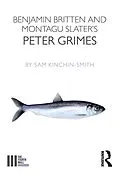ã `Who can turn skies back and begin again?' -Peter ã This book contends that Peter Grimes, widely regarded as one of the greatest and most influential operas of the 20th century, is also one of the British theatre's finest `lost' plays. Seeking to liberate Britten and Slater's work from the blinkered traditions of theatre and opera criticism, Sam Kinchin-Smith poses two questions: If an opera was created like a play, and can be staged as a play, is it a play? If a portion of its success and influence is the product of this newly identified theatrical engine, is it then a great play? The answers involve Wagner and W.G. Sebald, George Crabbe and Complicite, Akenfield and Twin Peaks. Challenging long-established narratives of post-war theatre history, this book makes a compelling case for why practitioners and scholars of performance ought to pay more attention to Britten and Slater's achievement - a milestone of unconventional English modernism - and perhaps to other operatic masterpieces too.
Autorentext
Sam Kinchin-Smith , like Peter Grimes, was born in Suffolk and now lives on/in a boat. He works for the London Review of Books and has written for publications including the New Statesman, Condé Nast Traveller and the Independent.
Klappentext
`Who can turn skies back and begin again?' -Peter This book contends that Peter Grimes, widely regarded as one of the greatest and most influential operas of the 20th century, is also one of the British theatre's finest `lost' plays. Seeking to liberate Britten and Slater's work from the blinkered traditions of theatre and opera criticism, Sam Kinchin-Smith poses two questions: If an opera was created like a play, and can be staged as a play, is it a play? If a portion of its success and influence is the product of this newly identified theatrical engine, is it then a great play? The answers involve Wagner and W.G. Sebald, George Crabbe and Complicite, Akenfield and Twin Peaks. Challenging long-established narratives of post-war theatre history, this book makes a compelling case for why practitioners and scholars of performance ought to pay more attention to Britten and Slater's achievement - a milestone of unconventional English modernism - and perhaps to other operatic masterpieces too.
Zusammenfassung
a`Who can turn skies back and begin again?' -Peter a This book contends that Peter Grimes, widely regarded as one of the greatest and most influential operas of the 20th century, is also one of the British theatre's finest `lost' plays. Seeking to liberate Britten and Slater's work from the blinkered traditions of theatre and opera criticism, Sam Kinchin-Smith poses two questions: If an opera was created like a play, and can be staged as a play, is it a play? If a portion of its success and influence is the product of this newly identified theatrical engine, is it then a great play? The answers involve Wagner and W.G. Sebald, George Crabbe and Complicite, Akenfield and Twin Peaks. Challenging long-established narratives of post-war theatre history, this book makes a compelling case for why practitioners and scholars of performance ought to pay more attention to Britten and Slater's achievement - a milestone of unconventional English modernism - and perhaps to other operatic masterpieces too.
